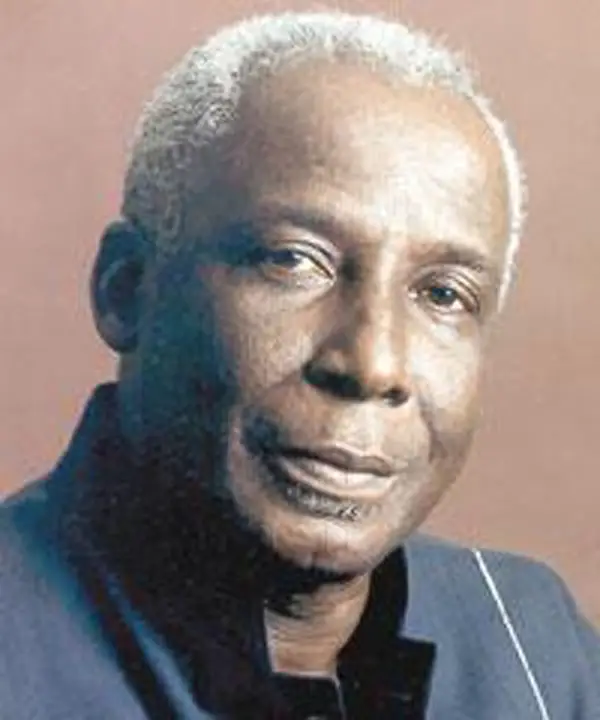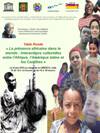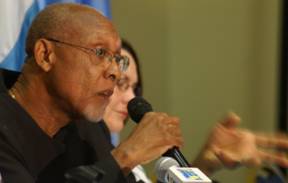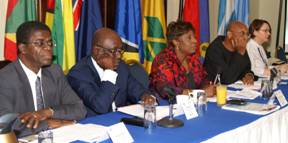Professor Rex Nettleford – Distinguished Member of the UNESCO Family
 As was aptly stated in his eulogy, ‘His life stood as an excellent example of how education, talent and wise nurturing can combine to produce the highest excellence out of circumstances of limited social and material privilege.’ In other words, the life of Professor the Honourable Ralston ‘Rex’ Nettleford, member of the Order of Merit of Jamaica, member of the Order of the Caribbean Community, Fellow of the Institute of Jamaica, Honorary Fellow of Oriel College, Oxford, was the manifestation of UNESCO’s conviction that quality and inclusive education for all can contribute to the transformation and enrichment of peoples and their societies.
As was aptly stated in his eulogy, ‘His life stood as an excellent example of how education, talent and wise nurturing can combine to produce the highest excellence out of circumstances of limited social and material privilege.’ In other words, the life of Professor the Honourable Ralston ‘Rex’ Nettleford, member of the Order of Merit of Jamaica, member of the Order of the Caribbean Community, Fellow of the Institute of Jamaica, Honorary Fellow of Oriel College, Oxford, was the manifestation of UNESCO’s conviction that quality and inclusive education for all can contribute to the transformation and enrichment of peoples and their societies.
Professor Nettleford represented Jamaica, par excellence, as a member of the Executive Board of UNESCO from 1991-1995. Moreover, up to the time of his passing, he served as Vice-Chairman of the Jamaica National Commission for UNESCO. He was also an active member of the UNESCO International Scientific Committee for The Slave Route Project, which he had previously chaired…”
In honour of his significant contributions, UNESCO has participated in various events commemorating his life:
Special Tribute and Round Table in appreciation of the late ‘Rex’ Nettleford were held at UNESCO headquarters, Paris on 4 June 2010.

In his Reflections on the Life of Professor the Hon. Ralston ‘Rex’ Milton Nettleford, Mr. Esmond Reid, Deputy Permanent Delegate of Jamaica to UNESCO said “I am deeply honoured to be a part of today’s activities that have been organized in recognition of the immense scholarship and cultural legacy that has been bequeathed to us.”
In this ceremony a video on his life and legacy, produced by Mr. Lennie Little-White, was also presented.
Following the Special Tribute ceremony was The Round Table on “The African Presence in the World : Cultural Interactions between Africa, Latin America and the Caribbean” (June 4, 2010) commemorating the anniversary of the independence processes of these regions.
Panelists included Prof. Andreas Bansart and Prof. Barry Chevannes of the University of the West Indies, Dr. Nelly Schmidt and Prof. Paul Lovejoy of the International Scientific Committee of the Slave Route Project and Mr. Doudou Diène, Former Director of Intercultural Projects Division.
CSA Roundtable: Remembering Rex Nettleford
Professor Nettleford was showcased at the Caribbean Studies Association (CSA) XXXV Annual Conference May 24 – 28, 2010 in St Peter, Barbados. It was held under the theme “Understanding the Everyday Occurrence of Violence in the Cultural Life of the Caribbean”.
SSHRC & UNESCO Special Panel in memory of Rex Nettleford
“Dance Caribbean: Embodying Spirit, Nation and Diaspora in Movement”
Dr. Maria Smith presented “Silencing: Talk Back Through the Dance,” which examined how through dance the Professor sought to preserve the intangible heritage and promoted a culture of difference by recording the dance iconography of the major folk forms of the traditional culture. It also looked at how the issue relating to the Slave Route Project – Breaking the Silence was addressed by raising the issues of Blackness, Race and heightening the African characteristics that survived the Middle Passage.
Moderator: Gordon Rohlehr, University of the West Indies, St. Augustine, Trinidad and Tobago
Marjorie Whylie, University of the West Indies, Mona, Jamaica.
Dr. Maria Smith, Programme Manager, Jamaica National Commission for UNESCO
L’Antoinette Stines, Artistic Director/Founder L’Acadco: A United Caribbean Dance Force, Jamaica
Monika Lawrence, National Dance Theatre Company, Jamaica and University of Technology, Jamaica
Christian Campbell, University of Toronto, Canada
A Focus on Professor Nettleford’s Contribution to Rastafari Scholarship
His speech from the CSA 2009 Opening Ceremony
Interpretation of Pocomania, Gerrehbenta and Kumina by Nettleford for stage
Launch of book “Dance Jamaica: Renewal and Continuity, 1962-2008
Chair: Michael Barnett, University of the West Indies, Mona, Jamaica.
Rastafari and the critical tradition, Barry Chevannes, University of the West Indies, Mona, Jamaica.
Reflections on the minority and majority report: Africa is Jamaica and Jamaica is Africa, Michael Barnett, University of the West Indies, Mona, Jamaica.
Negotiating the African presence: Rastafari influence in the West – Jalani Niaah, University of the West Indies, Mona, Jamaica.
Professor Barry Chevannes – His Interactions with UNESCO

Professor The Honourable Alston “Barry” Chevannes, OJ, OD, well known anthropologist and sociologist, has long been committed to advancing UNESCO’s goals of global understanding and engagement in education, the sciences and culture as is evidenced by his frequent involvement UNESCO initiatives.
His devotion to the retention and appreciation of culture is apparent with his participation in different cultural events. He acted as a panelist in The Round Table on “The African Presence in the World : Cultural Interactions between Africa, Latin America and the Caribbean”It was organized at the occasion of the commemoration of the bicentenary of the independence process of Latin America and Caribbean countries and the fifteenth anniversary of the independence of African countries. Another such event was the conference “Harnessing Culture for Positive National Transformation” (June 29 – July 1, 2010) where he gave the keynote address.
Similarly, Professor Chevannes has made many strides in combating youth disenfranchisement. He was tasked to lead the Commission on Youth Development (July 2006) by undertaking “a full scale analysis of the challenges and opportunities for youth in the CARICOM Single Market and Economy (CSME); and making recommendations to improve their well-being and empowerment”. He was also present at the first forum of ministers responsible for social and sustainable development in the Caribbean “Social Development Strategies for Caribbean Youth in the Context of the Global Crisis” 24-26 January 2010, Jamaica.
Additionally, Prof. Chevannes was part of the UWI team in the initial set up for Youth Path, (UNESCO Youth Poverty Alleviation Through Tourism & Heritage Project) whereby Youth in poor communities of the Caribbean are trained in the development and documentation of natural and cultural heritage sites to become the centre of internal or international tourism and so develop their communities and reduce poverty. He also presented the Declaration from the first forum at the CARICOM Summit on Youth Development (29-30 January 2010, Paramaribo, Suriname).
 Furthermore, in his efforts to support educational engagement , he was the Key Presenter for PANEL 3 “Developing Quality Policy Responses, supported by Research and Dialogue”. This session was chaired by The Honourable Olivia Grange, MP, Minister of Youth, Sports and Culture (Jamaica). Likewise, he was involved in “The Caribbean Symposium on Inclusive Education”(Hilton Kingston, Jamaica, 5-7 December 2007 by the UNESCO Cluster Office). As a Professor of Social Anthropology, he presented a Public lecture at UWI Mona titled “Percy the Chick: Education and male socialization in the Caribbean”.
Furthermore, in his efforts to support educational engagement , he was the Key Presenter for PANEL 3 “Developing Quality Policy Responses, supported by Research and Dialogue”. This session was chaired by The Honourable Olivia Grange, MP, Minister of Youth, Sports and Culture (Jamaica). Likewise, he was involved in “The Caribbean Symposium on Inclusive Education”(Hilton Kingston, Jamaica, 5-7 December 2007 by the UNESCO Cluster Office). As a Professor of Social Anthropology, he presented a Public lecture at UWI Mona titled “Percy the Chick: Education and male socialization in the Caribbean”.